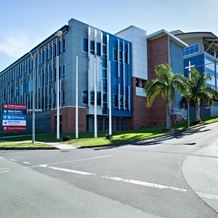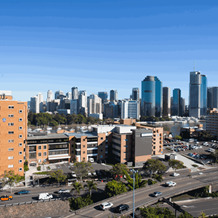Spotlight on St Vincent's Private Hospital Northside's Bariatric Surgeons
St Vincent's Private Hospital Northside
Two out of three Australian adults are obese or overweight. In this article, read how three of St Vincent's Private Hospital Northside's Bariatric Surgeons are approaching Australia's obesity epidemic.
Dr Kevin Chan
Upper Gastrointestinal, Bariatric & General Surgeon

Since 2019, Dr Kevin Chan has teamed up with Dr Rob Finch and Dr David Mitchell to form Total Upper GI Surgery, based out of St Vincent’s Private Hospital Northside – all specialising in providing expert care for patients with bariatric and upper gastrointestinal surgery.
Dr Chan is a specialist general surgeon with his work focussing on a mix of bariatric surgery, upper gastrointestinal cancer surgery and general surgery.
He originally studied and trained as a pharmacist and worked in the field for one year before focussing on a medical career – and said he was fortunate to study and train with Dr Mitchell. They subsequently worked with Dr Finch at the Royal Brisbane and Women’s Hospital where he was an important mentor to both of them.
The trio are celebrating their fifth year in partnership and all speak of a collaboration and medical camaraderie that benefits their patients with shared knowledge and experience – and occasionally pairing up for joint surgery for more complex cases.
Dr Chan says he finds bariatric surgery the most rewarding of the operations that he performs, as it has the potential to have the most dramatic impact on the lives of patients.
“It really is the most effective way for people to lose significant amounts of weight especially for people who have BMI of over 40 who have struggled to lose weight over the years. Most people who see me to discuss bariatric surgery have had significant weight fluctuations over an extended period of time and often end up where they started after trying various diets,” says Dr Chan.
“Bariatric surgery is a way for people to achieve their health goals and more importantly, it’s the most effective way to have a positive impact on the co-morbidities which often exist with obesity such as diabetes, reflux, cardiovascular disease, hypertension and other metabolic diseases.
“But I always want my patients to understand that they need to do the hard work to achieve and maintain the weight loss.
“The bariatric surgery is just a tool but they need to be disciplined and diligent about doing the right things themselves. It’s not an easy way out and it’s not a shortcut, which is what some people think.
“It needs to be accompanied by a long term commitment and decision to change their habits around their diet - what they eat and the quantity that they eat, in company with having a regular exercise and activity regime that works for them.
“Surgery isn’t a silver bullet and the weight can come back on, so the post-surgical follow up with us – including the clinical reviews and dietitian’s reviews – are important.
“I will always spend time talking with the patient about what we think is going to work best for them and tailoring the procedure to the individual patient and their circumstances.”
Last year, St Vincent’s six bariatric surgeons (including Dr Chan, Dr Finch and Dr Mitchell) performed around 730 laparoscopic bariatric surgeries including the sleeve gastrectomy, and both single anastomosis (“mini”) and Roux-en-Y gastric bypass procedures.
Dr Chan says he conducts a number of revisional bariatric procedures – a surgery that modifies or reverses a previous weight loss surgery. These are performed with a considered approach taking into account the patient’s overall health and the best clinical path forward if post-surgical issues have arisen. Complications that may require revisional surgery are post-operative reflux or marginal ulcers.
He also performs a significant number of upper gastrointestinal cancer surgeries including treating cancers of the stomach and oesophagus.
Dr Kevin Lah
General Surgeon - Special interest in Upper GI

There was a point in the career of Dr Kevin Lah, when he reached a fork in the road where he contemplated whether to be a cancer surgeon, orthopaedic surgeon or a bariatric surgeon.
Having started studying physiotherapy years earlier, he had then pivoted to medicine and later general surgery. The pros and cons of each surgical specialty had their own compelling case.
There were plenty of family members to whom he could have turned to for guidance - his grandfather was a gastroenterologist back in South Korea and his cousin is a radiation oncologist. But Dr Lah charted his own course.
“I realised during my training that I enjoyed working with my hands and I loved general surgery with the variety of opportunities that it provided,” said Dr Lah.
“I was fortunate enough during my training to work with leading bariatric surgeons Dr George Hopkins and Dr Rob Finch (who both are based at St Vincent’s Private Hospital Northside) who were both very influential in my decision to then specialise in bariatrics.”
Dr Lah has worked with leading bariatric surgeon Dr Hopkins at his Obesity Surgery Brisbane practice since 2021. Dr Hopkins founded OSB, a practice devoted to the treatment and management of obesity, weight-related health issues and holistic health and wellness, which provides surgical and non-surgical options, tailored to each individual patient.
Dr Lah did additional training as an upper gastrointestinal surgeon at Royal Brisbane and Women’s Hospital. His work now is a fairly even mix of upper GI, bariatric and complex hernia procedures.
But it’s the bariatric work that he says provides him with the greatest reward and satisfaction and is the most impactful for his patients.
“I became a doctor and surgeon because I wanted to help patients and I’ve found with bariatric surgery that for people who have been struggling with their weight or obesity for many years, that it is the one thing that gives them the best opportunity for a second chance at life,” says Dr Lah.
“My approach with patients who come to see me is that I want to ensure that they’re well informed about all of the options around weight loss which ranges from various surgical options through to medications and injectables such as Ozempic.
“Some people have shown good benefits from Ozempic although they have to understand that to continue gaining that benefit, they have to be using it for life.
“But the reality is that for many patients, they are only going to be able to shift significant weight if they go down the surgery path and patients have to understand that it’s not an easy option for anyone. I want them to understand that they should have the mindset where they commit to lifestyle changes around healthier eating, good food choices and regular exercise.
“Those lifestyle changes are the absolute key to success to losing weight - and bariatric surgery is an excellent tool - in fact the best tool available - to lose a large amount of weight especially for people with a BMI (Body Mass Index) over 45 or who are morbidly obese.
“I’ve had patients who I’ve performed bariatric surgery on, who come back after 12 months and it really has changed their life - they’ve lost the weight and kept it off.
“They have the energy and mobility to get out and play with their kids or exercise with the family. Walking up a set of stairs is no longer a challenge for them.
“One of my patients weighed up around 200kg and after having gastric bypass, they had lost over 30kg which was enough to make a big difference to their life and they continued to lose weight.”
Dr Lah says the surgical support team at St Vincent’s Private Hospital Northside was world class with the number and frequency of bariatric surgeries performed each year at the hospital.
Last year, St Vincent’s six bariatric surgeons (including Dr Lah and Dr Hopkins) performed around 730 laparoscopic bariatric surgeries including the sleeve gastrectomy, and both single anastomosis (“mini”) and Roux-en-Y gastric bypass procedures.
“The surgery runs like clockwork which is testament in large part to the quality of the people who work there, the processes and systems as well as the frequency that procedures are performed. All the staff know what to do and safety also comes from doing things repeatedly.”
Dr Lah says he also always impresses on his patients the impact of comorbidities and other health issues have on them, saying a variety of problems usually go hand in hand with obesity.
“There's usually a bigger price to pay for patients when it comes to comorbidities which can range from ongoing inflammation, diabetes, high blood pressure, heart issues and cancer,” he says.
“But our general aim is to give each patient a second chance at life and hopefully they grab that second chance and enjoy a better quality of life and a longer life.”
Dr Ian Shaw
Upper Gastrointestinal, Bariatric & General Surgeon

Bariatric surgeon Dr Ian Shaw hears a common story from patients who consult him, when they’re considering weight loss surgery and they provide him with their history of battling the chronic illness.
“In probably eight out of 10 cases they have all tried a range of diets and they describe a common ‘yo-yo’ pattern where their weight has fluctuated pretty wildly over years and they often ultimately end up re-gaining more weight than they have lost,” says Dr Shaw.
“This is usually very disheartening and discouraging, especially when they’ve taken positive steps to try to tackle their weight issue. But to a certain extent, genetics and evolution are stacked against them as the brainstem has an incredible survival instinct which kicks in when any weight loss occurs.
“Whenever significant weight loss occurs, survival mechanisms in the unconscious brain will intervene with an appetite which is insatiable until the weight has returned to what the unconscious brain thinks is the correct weight for you.
“A few extra kilograms are also often regained in case the same period of relative fasting (dieting) is experienced again. And you might not prefer the same weight your brain prefers! Many of us don’t. Regardless, the unconscious brain usually wins the battle.”
Dr Shaw says he enjoys building rapport with his patients and empathises with their hopes and fears when they come to see him. He credits that with his family background in medicine with both his grandfather and father being rural GPs.
“I grew up in Goondiwindi and I am very glad I had that rural experience. I also witnessed first-hand the vital role that GPs play in the lives of their patients, particularly in smaller communities,” he says.
“My father was my inspiration – he was hard working, dedicated to his patients and multi-skilled. He had to do everything from looking after sick asthmatics to delivering babies and doing appendicectomies. It is a tough and demanding life and I could not have done what he did.”
Dr Shaw graduated from the University of Queensland in 1994 and after five years training through the Royal Brisbane and Women’s Hospital, he headed to the United Kingdom where he did further training with world-leading surgeons (in liver and upper gastrointestinal surgery) at the North Hampshire Hospital in Basingstoke.
Upon his return to Australia in 2005 he settled into general surgery broadening an interest in upper GI and bariatric surgery, spending time at Nambour Hospital and the Prince Charles Hospital at Chermside.
Dr Shaw is now one of six bariatric surgeons at St Vincent’s Private Hospital Northside. He has expertise in the laparoscopic approach to obesity, gastro-oesophageal reflux disease, gallstone disease, abdominal wall and groin herniae, and colonic cancer.
He continues to be concerned about the obesity epidemic in Australia which has one of the highest rates of obesity in the world, ranking fifth among OECD countries. Around 14 million Australians are living with obesity or are overweight – that’s 2 in every 3 adults and 1 in 4 children.
Dr Shaw said for patients who have struggled to consistently lose weight and/or who are obese with a BMI of 40 or higher (35 for people with other metabolic diseases present) surgery really was the best choice to achieve a healthy weight.
“Whilst I take the time to understand the issues and background that has brought people into my consultation room, and to have them consider all of the options available for weight loss, for many people bariatric surgery is the best choice,” he says.
“There’s no evidence to show that diets have produced more than single digit percentage weight loss and where a diet or series of diets have enabled them to keep the weight off. They usually end up with that “yo-yo” effect which is often worse for their overall health.”
Last year, St Vincent’s six bariatric surgeons (including Dr Shaw) performed around 730 laparoscopic bariatric surgeries including the sleeve gastrectomy, and both single anastomosis (“mini”) and Roux-en-Y gastric bypass procedures.
Dr Shaw said he always takes the time and care to explain to his patients both the benefits and risks associated with bariatric surgery.
He said it was also vitally important for them to understand that surgery wasn’t an easy option and wasn’t a “quick fix” or “cure”. “Unless the patient is able to make long-term lifestyle changes around healthier food choices and regular and appropriate exercise and body movement, the weight they lose can be regained.
For most people it ends up being completely life changing for them.” “The most common two phrases I hear are “This is the best thing I have ever done” and “I wish I had done it sooner,” says Dr Shaw.
Most gastric bypass patients end up losing around 70 per cent of their excess weight within 12 to 18 months.
- Home
- Patient News
- Spotlight on St Vincent's Private Hospital Northside's Bariatric Surgeons




